By David P. Diaz, Ed.D.
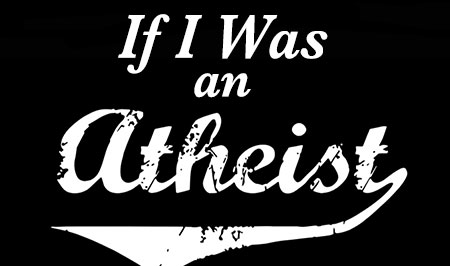
Background and Purpose
When I was a college professor, I would sometimes require my students to take a stand on one of two opposing positions: abortion v. pro-life, capital punishment v. long-term incarceration, or gun advocacy v. gun control, to name but a few. Then I would ask each student what side they stood for and, when they made that commitment, I would assign them to write a research paper in favor of the opposing position (i.e., the one that they didn’t support). YOU CAN PROBABLY IMAGINE HOW WELL THAT WENT OVER! But, I believed then and still believe to this day that it is vitally important to thoroughly understand both sides of an issue before committing oneself to either.
Attempting to learn about an opposing position doesn’t mean one needs to capitulate to those beliefs. On the contrary, learning about other beliefs helps us to better understand our own views while also cultivating empathy for those with opposing viewpoints. However, in some cases, it may mean changing our own views in light of the evidence. Regardless, this process is perfectly compatible with the adage: “and you will know the truth, and the truth will set you free” (John 8:32 NASB95). NO HONEST, RATIONAL PERSON NEEDS TO FEAR THE TRUTH.
Part of my journey toward theism involved attempting to understand various philosophies and worldviews.1 During this process, I wondered to myself how I might approach the defense of an atheistic position. Just as there are many theistic systems of belief, there are also many flavors of atheism. While it is true that I am not an atheist,2 it is nonetheless also true that I have known a good number of well meaning, disciplined, intelligent and thoughtful people who claim to be one. My knowledge of atheism has been brought about by traversing many disciplines. The names of my atheistic sources should be recognizable to most readers and include such luminaries as Antony Flew, Michael Martin, Daniel Dennett, Richard Dawkins, Stephen Hawking, Lawrence Krauss, Richard Carrier, Bart Ehrman, and others.
In this essay, I hope to
demonstrate how I would defend atheism. Or, more accurately, how I would avoid defending atheism and instead
focus on a more strategic plan of attacking
theism. Sometimes the best defense is a good offense.
Types of Atheism
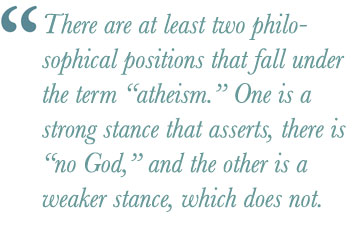
The word “atheism” comes from the Greek language. It can be divided into “a,” a Greek prefix meaning “not,” or “without,” and “theos,” meaning “god.”3 There are at least two philosophical positions that fall under the term “atheism.” One is a strong stance that asserts, there is “no God,” and the other is a weaker stance, which does not. While adherents of both views are without a belief in God, the strong position defends a positive belief that there is no God, while the other view avoids making a truth-claim about God one way or the other.
Positive Atheism
In years gone by, most atheists would have taken the intellectual high-road by stating and defending positive arguments against the existence of God. This position has been called positive atheism. The Urban Dictionary characterizes positive atheism as “hardcore atheism.”4 In a book titled: “Atheism: A Philosophical Justification,” Michael Martin, emeritus professor of Philosophy at Boston University, illustrates this more aggressive approach: “My object is not utopian. It is merely to provide good reasons for being an atheist. Atheism is defended and justified” (Martin 1990, 24). He went on to conclude: “My object is to show that atheism is a rational position and that belief in God is not” (Ibid.). In this sense, Martin developed arguments, both, in favor of atheism and also against theism. Martin was clearly suggesting that atheists should be prepared to demonstrate, in a strong or positive manner, why or how atheism is a rational belief, while theism is not. In short, a positive atheist disbelieves in God and will often craft arguments to support the rationality of such a position.
Negative Atheism
Although I can appreciate the philosophical high-road approach, it’s a non-starter for most atheists. Since theists have given numerous reasons for their beliefs, atheists would need to refute all of these to secure their position. But this is difficult and requires a certain level of expertise, not to mention effort. Thus, the positive view of atheism (i.e., the denial of theism) has spawned a number of alternatives. One of those is called negative atheism. According to the late analytic philosopher Antony Flew, a negative atheist is “not someone who positively asserts the non-existence of God; but someone who is simply not a theist” (Flew 1976).
Sometimes called weak atheism or soft atheism, negative atheism is any type of atheism where the adherent does not believe in any deities but at the same time does not explicitly assert that there are none. In short, a negative atheist has no belief in God, but does not deny the existence of God. Negative atheism became the most popular view of atheism in the latter half of the 20th century and into the 21st century.
Strategies
1. Choosing a Certain Brand of Atheism
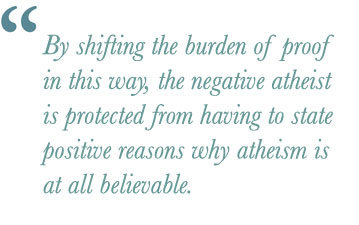
So, what would I choose: positive or negative atheism? Without a doubt, I would distance myself from positive atheism. Those who have defended the positive view (even if not successfully), tend to be professionals in some academic field (i.e., physical science, philosophy, etc.) and, therefore, possess the necessary skills to make a positive case within their area of specialization.5
On my part, I would immediately claim the view championed by Flew: negative atheism. Flew indicated that any “thorough and systematic inquiry [regarding the question of God] must start from a position of negative atheism” (Miethe & Flew 1991, 11). This starting point became known as “the presumption of atheism.” By presuming atheism as a starting point, the atheist hopes to shift any intellectual or rational burden of proof to the theist to defend their beliefs. According to Flew, “the burden of proof lies on the theist proposition” (Ibid.). By shifting the burden of proof in this way, the negative atheist is protected from having to state positive reasons why atheism is at all believable.
There is an irony in attempting to shift the burden of proof, which reminds me of a story about a man who was leading a group of hikers up in the mountains. He points at a rickety bridge that spans a deep ravine and says; “That bridge is stronger than it looks. It will hold…” Then, nodding at one of the hikers, he says, “You go first.” While the negative atheist believes there is no God, he or she would just as soon not have to prove the point. And while shifting the burden of proof may serve to keep one off the hot seat, it also doesn’t allow one to make and defend her own viewpoint. Sadly, negative atheism often leaves the atheist with nothing much to talk about. Indeed, many of today’s atheists seem perfectly happy critiquing theistic beliefs without developing and defending too many of their own.
Some adherents of negative atheism claim that the entire notion of God is unintelligible. In other words, no one has a proper idea or conception of what “God” is supposed to mean and, therefore, no meaningful statements can be made about God. However, this is nonsense. The very statement, “God has no meaning,” is itself meaningless unless the word “God” can be defined within a specific context. In other words, how can one say that the term “God” has no meaning if one can’t find a meaningful way to express its meaninglessness?! And, if they can explain it, then it must have meaning! Therefore, the atheist should simply allow theists to define their concept of God at the outset, at least then they can begin a discussion. Otherwise, any potential for dialogue disappears.
2. Focus on Religions that Prize Objective Truth
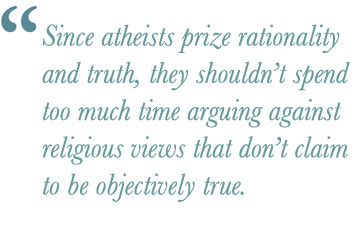
I have narrowed this discussion so that I can demonstrate how an atheist might respond to the notion of the personal God of Christian theism. While it may seem to be a good tactic to lump Christianity together with all the rest of the world religions, this strategy may not necessarily be relevant to many atheists. Since atheists prize rationality and truth, they shouldn’t spend too much time arguing against religious views that don’t claim to be objectively true. Christian theism takes truth and rationality seriously. In the Christian worldview, God exists as an objective, rational being, and truth is also objective and has correspondence to the real world (see Diaz 2017a). Indeed, God’s word is truth (Ps. 119:160; John 17:17).
On the other hand, certain religions of the East (e.g., Hinduism, Zen Buddhism, Sikhism, Confucianism, Taoism, Chinese folk religion, etc.) have, in general, not been concerned with demonstrating the truth or rationality of their own views. Indeed, reason plays a much smaller role in many Eastern religions, which typically favor direct, intuitive experience. Unlike these religions, Christianity claims certain truths to be exclusive as well as objective. Since atheists claim to have a rational worldview, they can save time and effort by focusing their arguments directly on the Christian worldview. If Christian theism can be toppled, then any other objective religious worldviews can also be had.
3. Don’t Discuss the ‘Atheistic Worldview’
The worldview that undergirds most atheistic positions is usually found in some form of materialism/physicalism.6 Materialism is based on the belief that everything in the universe is reducible to material causes. On this account, there are no supernatural, spiritual or metaphysical realities in the universe. Materialism also promotes the scientific method7 as the only means of providing true knowledge about the universe. But here is where the atheist can run into problems: Scientific method assumes that the world is naturalistic (i.e., solely the result of physical causes). However, simply assuming there is a naturalistic explanation for every event in the universe doesn’t mean there are no supernatural or metaphysical aspects of the world. The mere decision to study the world in a naturalistic way does not mean that the world is solely naturalistic.
Further, scientific “truth” is always provisional. Whatever conclusion is drawn from this method is ultimately refutable, and that refutation is refutable, and so on, and so on. The scientific method is based on many assumptions (see Diaz 2018a) and, since assumptions are unprovable (that’s what makes them assumptions), one can never know with certainty that scientific truth is absolute truth. As I have said before (Ibid.):
[S]cience is not the panacea for all human needs. It will teach us some things, but not others. It will help us cure some diseases, but not others. It will improve the quality of some lives, but not others. Science is one of the tools that help us to understand our world, but there are also many others.
Ultimately, materialism is a self-defeating position because even the mere theory of materialism is itself not reducible to material causes. That is, the “idea” or “concept” (i.e., “theory”) that everything is made up of molecules does not itself consist of molecules. Thoughts, ideas, concepts, and indeed consciousness itself, cannot be accounted for by such a simplistic notion as materialism. Thus, the belief that everything is reducible to some form of matter constitutes a grave problem for atheism.
Materialism is, ultimately, a worldview based on faith. Atheists who rule out God on the basis of their own faith commitment to materialism are in no position to forbid theists from appealing to God as the creator of the universe. If atheists presuppose the truth of naturalism, then other worldviews must be allowed their own presuppositions. And, if everyone in a debate clings unyieldingly to their own presuppositions without conceding that they may be mistaken, then a discussion will never get off the ground.
In summary, if—as an atheist—I cannot prove that materialism is true, and if I will not allow my own atheistic presuppositions to rest on the same playing field as the theist, then I would simply have to avoid any discussion of the atheistic worldview. In fact, I would just avoid the topic of worldviews altogether.
4. Attempt to Pose Unanswerable Questions
The best strategy for opposing theism is to enmesh theists in a quagmire of, hopefully, unanswerable questions. As an atheist, I would try to discredit the Christian doctrine of inspiration.8 This strategy can be managed simply by looking into the Bible to find inconsistencies, contradictions and errors of matters of fact that would demonstrate that it cannot be inspired by God. I mean, how could the Bible be inspired by God if it contains errors? If one looks at the Bible with materialistic presuppositions, it should be easy to find errors and contradictions. Right?! After all, if one assumes materialism is true and all events in the universe are caused solely through naturalistic means, then, by definition, nothing supernatural could exist. This provides a simple and, if I do say so myself, ingenious way of casting doubt on the historical claims found in the Bible, especially the miraculous ones. And, since my atheistic viewpoint would take no responsibility for burden of proof, the Christian theist would have to track down all the answers to my objections, while, in the meantime, I’d be kicking back enjoying the latest issue of American Atheist magazine. It doesn’t make any difference that I cannot prove the truth of materialism in the first place. Nor does it matter that I may have plucked a biblical contradiction or two out of context, or that a reasonable answer could be had through proper interpretive or historical methods. Admittedly, this tactic has little to do with the responsibility to look for truth, but it does muddy the water. As The Bard would say, “All’s well that ends well” (Sparknotes 2019).
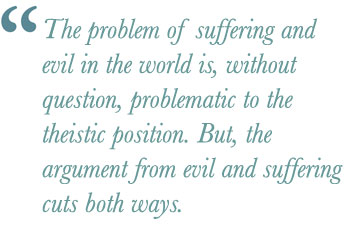
If I was an atheist, I would also focus on what I consider to be the strongest negative argument against Christian theism: reconciling the idea of an all-powerful, all-good God with the existence of evil in the world. The argument goes something like this: If God is all-powerful, he could destroy evil. And if He is all-good, he would destroy evil. But, evil is not destroyed. Therefore, an all-good, all-powerful God cannot exist.
The problem of suffering and evil in the world is, without question, problematic to the theistic position. But, the argument from evil and suffering cuts both ways. If the atheist concedes, for the sake of the above argument, that the God of the Bible may indeed exist (i.e., one who is all-good, all-powerful, all-knowing, etc.), then both the atheist and the theist must admit that such a God may have reasons to permit evil and suffering that are beyond the finite understanding of man. Ultimately, one must decide whether or not there is a morally sufficient reason for God to permit evil to exist.
Explaining the thoughts of medieval theologian Thomas Aquinas on the greatest good for mankind, Philosopher Eleonore Stump (2013, 93) said: “the ultimate good for any human person is union with God.” The process of achieving this goal exemplifies what it means for humans to “flourish” and flourishing, in turn, exemplifies one’s degree of closeness to God. Stump suggested that suffering can and often does remove the obstacles that prevent humans from coming into a closer relationship of love with God. So, not only is flourishing compatible with suffering, indeed, suffering may be essential to flourishing. Theists don’t claim to always understand why God would allow some people to suffer, but Stump believes there is a morally sufficient reason for God to allow suffering (Ibid., See also Stump 2010).
I’ve listened to some atheists who claim to have a solution to the problem of suffering and evil (apparently, these finite beings think they can solve an incredibly complex problem that an infinite being cannot). They sometimes say, “If God really existed, he would make it impossible for anyone to commit an evil act.” So, I guess they are saying that, if one person wants to kill another with a gun, God could turn the bullets into bubbles. Or, if someone picks up a rock to throw at a window, God could turn the rock into a feather. In other words, the proposed “solution” is that God should give us free will but at the same time eliminate all possible consequences attendant to being free. Simple. Right? But, in my mind, this is stereotypical of atheistic solutions because, for one thing, it assumes that the atheist making the statement possesses all knowledge. For how else could he or she know for sure that an all-powerful, all-good, all knowing, infinite being has it all wrong?! In fact, how could they even fathom what a solution this complex would look like? Further, this scenario strips free will down to nothing more than a nice idea. It reminds me of the first Matrix movie when agent Smith was making a point to Neo: “Tell me Mr. Anderson, what good is a phone call if you are unable to speak?” [And then Neo’s mouth goes all gummy. Very cool.] We all want free will, we recognize its essentiality, but what use is it if someone else controls the consequences? Would that manner of choice be truly free? Under this “solution,” the outcome of any action becomes not the will of the person who acted, but the will of God who controlled it. In that case, we would not be free at all or, at very least, we would be free only some of the time. Nevertheless, “only those actions that are truly owned by a person can be considered free” (Diaz 2017b).
I don’t want to suggest that the problem of evil and suffering in the world isn’t a real and difficult problem for Christian theism. The occasions of pain and suffering are often terrible and terrifying, and no one with any sense of right and wrong would want themselves or anyone else to suffer. If I was an atheist, I would attack this weakness along with any other weakness I could find (or invent) and then, perhaps, I would feel better about my own lack of belief in God. However, these words from the late cleric, Thomas Merton (1999, 143), may ring true: “We refuse to hear the million different voices through which God speaks to us, and every refusal hardens us more and more against His grace—and yet He continues to speak to us: and we say He is without mercy!”
Conclusion
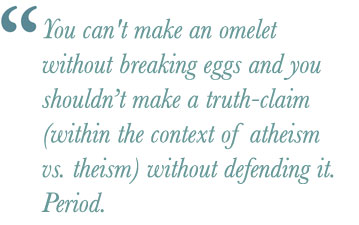
Is it permissible for atheists, of any stripe, to avoid defending atheism in favor of merely attacking theism? And, should an atheist attempt to completely shift the burden of proof of the existence of God to the theist? It depends. Like anyone else, atheists like to give their opinions and in doing so almost always make some kind of truth claim. But when they do, they are under a rational obligation to defend their claims. If they want to simply say, “I don’t believe in God” and leave it at that, then they are certainly entitled to their own personal opinions. But, without any compelling reasons to substantiate their opinions, that’s all they are; opinions. But any time someone makes a claim, or counterclaim, about what is true or what is false, they are expected to defend it. You can’t make an omelet without breaking eggs and you shouldn’t make a truth-claim (within the context of atheism vs. theism) without defending it. Period.
God created man to be in a loving relationship with Him, forever. According to Aquinas this is the greatest possible good that mankind can achieve. God gave us free will because that is the only way that one can truly love someone else. This gracious gift of free will not only allows us to develop a loving relationship with God but also with our fellow humans. It is through God’s grace that we have the potential for enjoying goodness, peace, and love at the highest level. However, this gift can be, and often is, abused. This is the risk of having true free will.
In all honesty, if I was an atheist, I would probably come to the same conclusion that I did many years ago now. Atheism is a worldview that has no final answers. Not only to the physical questions of the origin of the universe, the origin of life, and how impersonal mindless matter can cause a rational mind, but also to the great spiritual questions of our time: Where do I come from? and Why am I here? Does life have purpose? or, Is this all there is? On the other hand, theism does provide answers (Diaz 2018b):
The whole of reality can be sufficiently explained only by a cause and ground that is transcendent to the universe. That is, the universe couldn’t have caused itself, nor did it suddenly emerge out of nothing, but must have been caused by something other. Christian theism asserts that the cause and ground of the universe is the uncaused creator God described in the Bible (Ps. 90:2). Thus, the assertion that God caused the universe is a simple, reasonable, and intellectually satisfying answer to the question of the origin of the universe.
In conclusion, it is probably now clear—if it wasn’t before—that the foregoing discussion represents some of the reasons why I am, ultimately, NOT an atheist… And yet, in this paper I’ve represented the kinds of strategies that are commonly found in the general atheist population. They want to have their cake and eat it too. Atheists often want theists to make truth claims first so they can sit back and critique those claims. They insist that they don’t have to share the burden of proof, but continue to act and speak as if atheism is a rationally defensible position. It may be, but not without argumentation.
I think that atheists and theists can engage in debate, but they must have some clear guidelines in place. They especially must agree on what underlying assumptions they can share and then use those to help guide their discussions. Whenever a truth claim is made, one must take up the burden of proof. There is no getting around that. And if one does not want to share the burden of proof, then they shouldn’t make statements about objective truth. And, in that case, they will just have to be content to sit on the sidelines.
About the Author
David P. Diaz, Ed.D. is the publisher and owner of Things I Believe Project. An educator and author, Dr. Diaz has a lifelong love of learning. His pen name (aka “Don Quixote”) comes from his love of chasing windmills (i.e., truth and other ideals) and his penchant for tongue-in-cheek humor: “Don Quixote was developing his arguments in such an orderly and lucid way that for the time being none of those listening could believe he was a madman.”
Bibliography
Diaz, D. P. “Absolute Truth? Absolutely!” Things I Believe Project. August 14, 2017. http://thingsibelieveproject.net/absolute-truth-absolutely/.
Diaz, D. P. “Socratic Dialogue: Does Man Have Free Will?” Things I Believe Project. October 3, 2017. http://thingsibelieveproject.net/socratic-dialogue-does-man-have-free-will/
Diaz, D. P. “Seeking the Truth: The Limits of Science and the Role of Philosophy and Theology” Things I Believe Project. February 18, 2018. http://thingsibelieveproject.net/seeking-truth-the-limits-of-science-and-the-role-of-philosophy-and-theology/
Diaz, D. P. “A Cosmological Argument for the Existence of God” Things I Believe Project. September 28, 2018. http://thingsibelieveproject.net/a-cosmological-argument-for-the-existence-of-god/.
Flew, Antony. The Presumption of Atheism and Other Philosophical Essays on God, Freedom and Immortality. London, UK: Paul Elek, 1976.
Geisler, Norman L., and William D. Watkins. Worlds Apart: A Handbook on World Views. Eugene, OR: Wipf and Stock Publishers, 2003.
“Hardcore Atheist,” Urban Dictionary, https://www.urbandictionary.com/define.php?term=Hardcore+Atheist (accessed April 10, 2019).
Martin, Michael. Atheism: A Philosophical Justification. Philadelphia, PA: Temple University Press, 1990.
Merton, Thomas. The Seven Storey Mountain. Kindle ed. San Diego, CA: Harcourt Brace, 1999.
Miethe, Terry L., and Antony Flew. Does God Exist?: A Believer and an Atheist Debate. San Francisco, CA: Harper San Francisco, 1991.
SparkNotes Editors. “SparkNote on All’s Well That Ends Well.” SparkNotes LLC. n.d.. http://www.sparknotes.com/shakespeare/allswell/ (accessed April 13, 2019).
Stump, Eleonore. “The Problem of Evil and the History of the Peoples: Think Amalek.” In Divine Evil?: The Moral Characters of the God of Abraham, 179-97. Oxford University Press, 2010.
Stump, Eleonore. Wandering in Darkness Narrative and the Problem of Suffering. Oxford, UK: Clarendon Press, 2013.
Footnotes
- A worldview represents a philosophical framework from which we view reality and make sense of life and the world. Our own worldview is a set of propositions (i.e., statements that express something that can be true or false) that we believe to be true about the world. Seven major world views include: Theism, Atheism, Pantheism, Panentheism, Polytheism, Deism, and Finite Godism. For more on world views see Geisler, Norman L., and William D. Watkins. Worlds Apart: A Handbook on World Views. (Eugene, OR: Wipf and Stock Publishers, 2003).
- Since I am a theist writing an article about defending atheism, I suppose I should begin by writing a brief explanation regarding the content of this article. My views on atheism are based on my current understanding of modern atheism, which is in turn based on my reading of (and listening to) many different sources. While there are clearly some tongue-in-cheek elements of my article, I believe that the strategy I outline is reasonable and has been used by many modern atheists. Nevertheless, to be clear, I am still a theist.
- In a broad sense, atheists don’t believe in any deities. This means that atheism would be incompatible not only with theism, but also deism, polytheism, and pantheism. However, this paper will reflect a narrower form of atheism and its response to the concept of a personal God. So, when I speak of “God,” I will use the definition of God that is accepted by Christian theism. Christian theism holds that there is one God who is the creator of all things. This God is three persons in one essence, a personal, eternal, all-powerful, all-knowing, infinitely good, transcendent being, who is completely free to do anything that is consistent with his nature.
- Urban Dictionary, Hardcore Atheist. https://www.urbandictionary.com/define.php?term=Hardcore+Atheist
- Examples include, Dawkins and Myers in biology, Hawking and Carroll in physics, Carrier and Ehrman in history, Dennett and Martin in philosophy, Blackmore and Pinker in psychology, etc.
- Materialism is a philosophical theory that claims that all reality consists of one kind of thing and that all distinctions in the world are nothing more than various alterations of the basic physical substrate. Many philosophers prefer to call the view physicalism because this term is more inclusive, encompassing not only material entities that are spatially extended but also fields and forces. In this study, I am using the terms “materialism,” and “naturalism” synonymously, unless otherwise indicated.
- Scientific method is a strategy for studying the world, by which adherents assume that the universe is a result of natural laws and is circumscribed by naturalistic theories. For purely methodological purposes, scientists choose not to look for nor consider supernatural causes during the process of conducting experimental or other types of research.
- In general, the doctrine of inspiration entails the proposition that the Scriptures have been written under the guiding influence of the Spirit of God and according to His purpose. However, the Bible is silent on the exact modus operandi of this process.